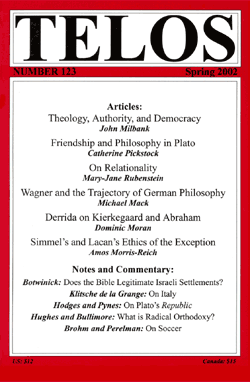By Telos Press · Friday, May 20, 2016 In or Out? Debating Britain’s EU Membership
3rd Seminar: National Security & Global Influence
In association with the James Madison Charitable Trust, the Centre for Federal Studies at the University of Kent is organising a series of three seminars entitled “In or Out? Informing the political debate and popular opinion on UK’s EU membership.” These seminars will take place in the run-up to the referendum and focus respectively on the economy, politics, and security.
Continue reading →
By Kyle Nicholas · Thursday, October 22, 2015  Mention “Radical Orthodoxy” in a room of people who are either quite intimately or only remotely acquainted with contemporary theology, and one surely will receive equal parts of praise and scorn. Whether it is being praised or scorned, however, it is plain that Radical Orthodoxy has worked its way deep into the fabric of contemporary theological discourse. Since the publication of John Milbank’s Theology and Social Theory in 1992, Catherine Pickstock’s After Writing in 1997, and Radical Orthodoxy: A New Theology, edited by Milbank, Pickstock, and Graham Ward in 1998, the Radical Orthodoxy movement has done what any explosively innovative intellectual movement will do after the hype settles down: mature or wither away. Mention “Radical Orthodoxy” in a room of people who are either quite intimately or only remotely acquainted with contemporary theology, and one surely will receive equal parts of praise and scorn. Whether it is being praised or scorned, however, it is plain that Radical Orthodoxy has worked its way deep into the fabric of contemporary theological discourse. Since the publication of John Milbank’s Theology and Social Theory in 1992, Catherine Pickstock’s After Writing in 1997, and Radical Orthodoxy: A New Theology, edited by Milbank, Pickstock, and Graham Ward in 1998, the Radical Orthodoxy movement has done what any explosively innovative intellectual movement will do after the hype settles down: mature or wither away.
In their article “What is Radical Orthodoxy?” (Telos 123, Spring 2002), John Hughes and Matthew Bullimore map out, in a short space and yet with crisp detail, the main themes in the Radical Orthodoxy project. For those familiar with the movement, their points will not come as a shock: that a deep metaphysical violence underlies modernity, political liberalism, and capitalism; that the philosophical and theological dualisms of modernity must be named and then overcome with the aid of both premodern and postmodern thought; and that in the face of proliferating violence it is Christian orthodoxy—in line with Aquinas, Boethius, Augustine, Gregory of Nyssa, and Iamblichean Neo-Platonism—that presents truly “radical” alternatives to the prevailing political, philosophical, and theological orders.
Continue reading →
By Telos Press · Wednesday, April 2, 2014 At this year’s Telos Conference in New York City, Telos Associate Editor Adrian Pabst outlined the theme of the upcoming Telos in Europe Conference, which will be held on September 5–8, in L’Aquila, Italy. This conference will focus on “The Idea of Europe,” and will offer speakers and attendees an opportunity to discuss Europe’s current crisis of identity. For complete details about the conference, as well as the full call for papers, please visit the conference page on the Telos Paul Piccone Institute website, located here.
Continue reading →
|
|
 Mention “Radical Orthodoxy” in a room of people who are either quite intimately or only remotely acquainted with contemporary theology, and one surely will receive equal parts of praise and scorn. Whether it is being praised or scorned, however, it is plain that Radical Orthodoxy has worked its way deep into the fabric of contemporary theological discourse. Since the publication of John Milbank’s Theology and Social Theory in 1992, Catherine Pickstock’s After Writing in 1997, and Radical Orthodoxy: A New Theology, edited by Milbank, Pickstock, and Graham Ward in 1998, the Radical Orthodoxy movement has done what any explosively innovative intellectual movement will do after the hype settles down: mature or wither away.
Mention “Radical Orthodoxy” in a room of people who are either quite intimately or only remotely acquainted with contemporary theology, and one surely will receive equal parts of praise and scorn. Whether it is being praised or scorned, however, it is plain that Radical Orthodoxy has worked its way deep into the fabric of contemporary theological discourse. Since the publication of John Milbank’s Theology and Social Theory in 1992, Catherine Pickstock’s After Writing in 1997, and Radical Orthodoxy: A New Theology, edited by Milbank, Pickstock, and Graham Ward in 1998, the Radical Orthodoxy movement has done what any explosively innovative intellectual movement will do after the hype settles down: mature or wither away. 






